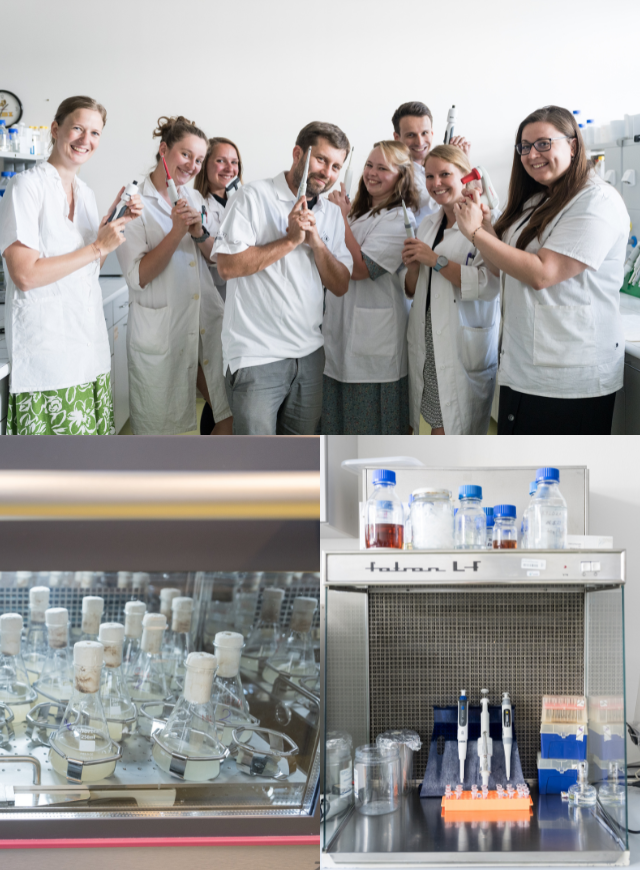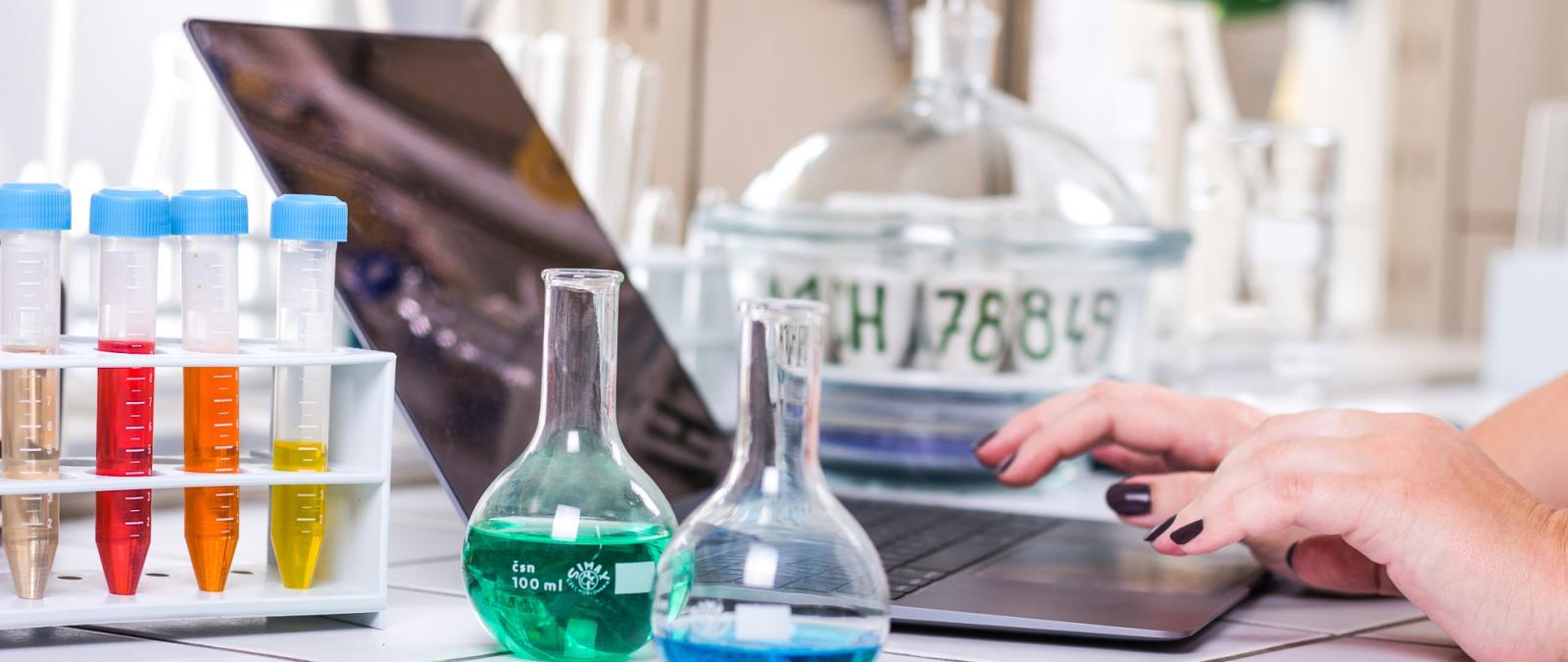Biotechnology and Biomaterials Group
In our research, we develop processes and technologies for the microbial production of industrially important substances such as biomaterials and functional packaging materials, food and feed ingredients such as enzymes, vitamins, pigments and other natural molecules. Creative activities cover the main thematic areas of the educational fields of chemistry, food science, biotechnology and biochemical engineering. The overlap with the scientific activities of the other institutes lies mainly in jointly solved projects with interdisciplinary issues, which enrich methodological approaches, modify the scope of the issues and enable an innovative view of food chemistry and biotechnology on a broader scale. Within the research group a number of projects have been addressed by GAČR, TAČR and NPO, most of these projects were or are focused on valorisation of food waste and biotechnology. The most important applied results, which are implemented in industrial practice, include the unique Hydal Biotechnology. It is a unique technology that processes used frying oil into biotechnological production of PHB-type bioplastics that can be used, among other things, for food packaging. The license for patent PS3835CZ was purchased by Nafigate a.s. and the biotechnology is marketed internationally under the trade name HYDAL. Currently, Hydal biotechnology is the only available technology in the world for mass production that can convert waste into PHB bioplastics. The technology based on the principle of circular economy has won a number of international awards, including the prestigious "Frost and Sullivan Innovation technology Award" (2015). The laboratory also cooperates with a number of industrial entities and institutions in the Czech Republic (Nafigate, a.s. Algae Farm, s.r.o., Institute of Instrumentation of the CAS, etc.). All ongoing projects and international collaborations involve students in the form of theses and internships.

-
Research group
Ing.
JiříHolub
Ph.D.
Specialization: yeast biotechnology
Field of interest: processing of food waste by microorganisms; red yeastIng.
JanObračaj
Specialization: Biotechnology, chromatography
Field of interest: Production, characterization and biological effects of enriched mixed microbial biomass, study and analysis of selected metabolites. Carotenogenic yeasts.Ing.
ŠtěpánkaTrachtová
Ph.D.
Specialization: microbiology, molecular biological methods
Field of interest: microbiological control of food, microbiome analysis, probiotic microorganisms, DNA isolation from complex samplesprof. Mgr.
VáclavBrázda
Ph.D.
Specialization: molecular biology
Field of interest: protein-nucleic acid interactions, bioinformatics and genome analysis -
Research scope
- Progressive methods of processing and reuse of waste from food production using the concept of circular economy.
- Biotechnological valorisation of food and agricultural by-products to produce industrially important metabolites and high value-added substances (vitamins, provitamins, antioxidants), nutraceuticals and ingredients for food supplements and cosmetics.
- Use of different types of microorganisms (cyanobacteria, bacteria) including extremophilic species for controlled overproduction of PHA-type biomaterials, which are biodegradable alternative bioplastics; development of methods for characterization of these biomaterials, their biological function and new possibilities for their application in industry.
- Molecular biological methods - further development of specialised genetic techniques to identify and characterise industrial organisms, to assess the authenticity of natural food ingredients and to analyse the interaction of food with human DNA.
-
Selected projects
- Development of a new material base based on Hydal PHA for the replacement of microplastics
- Demonstrative process for the production and chemical recycling of environmentally safe, superior bio-based packaging by plasma integration in the value chain
- New circular biotechnologies and biomedical applications
- Unraveling the role of polyhydroxyalkanoates in Schlegelella thermodepolymerans – promising environmental bacterium for next generation biotechnology
- Understanding of biological function, dynamics and biotechnological consequences of PHA cycle in Rhodospirillum rubrum
- Multifunctional high-value fungal biomass from the Norwegian agriculture supply chain by-products
- Involvement of polyhydroxyalkanoates in the bacterial stress response
- Other projects
-
Selected publications
- Polyhydroxyalkanoates synthesis by halophiles and thermophiles: towards sustainable production of microbial bioplastics
- The role of polyhydroxyalkanoates in adaptation of Cupriavidus necator to osmotic pressure and high concentration of copper ions
- Biotechnological Conversion of Grape Pomace to Poly(3-hydroxybutyrate) by Moderately Thermophilic Bacterium Tepidimonas taiwanensis
- The underexplored role of diverse stress factors in microbial biopolymer synthesis
- Evaluation of mesophilic Burkholderia sacchari, thermophilic Schlegelella thermodepolymerans and halophilic Halomonas halophila for polyhydroxyalkanoates production on model media mimicking lignocellulose hydrolysates
- Biosynthesis of versatile PHA copolymers by thermophilic members of the genus Aneurinibacillus
- Genomic and Phenotypic Comparison of Polyhydroxyalkanoates Producing Strains of genus Caldimonas/Schlegelella
- Use of Waste Substrates for the Lipid Production by Yeasts of the Genus Metschnikowia—Screening Study
- Combination of Hypotonic Lysis and Application of Detergent for Isolation of Polyhydroxyalkanoates from Extremophiles
-
Services offered
- Design and development of a biotechnological process:
- Selection of suitable microbial producer, optimization of media composition.
- Application of waste substrates and the principle of circular economy.
- Optimization of an already established process.
